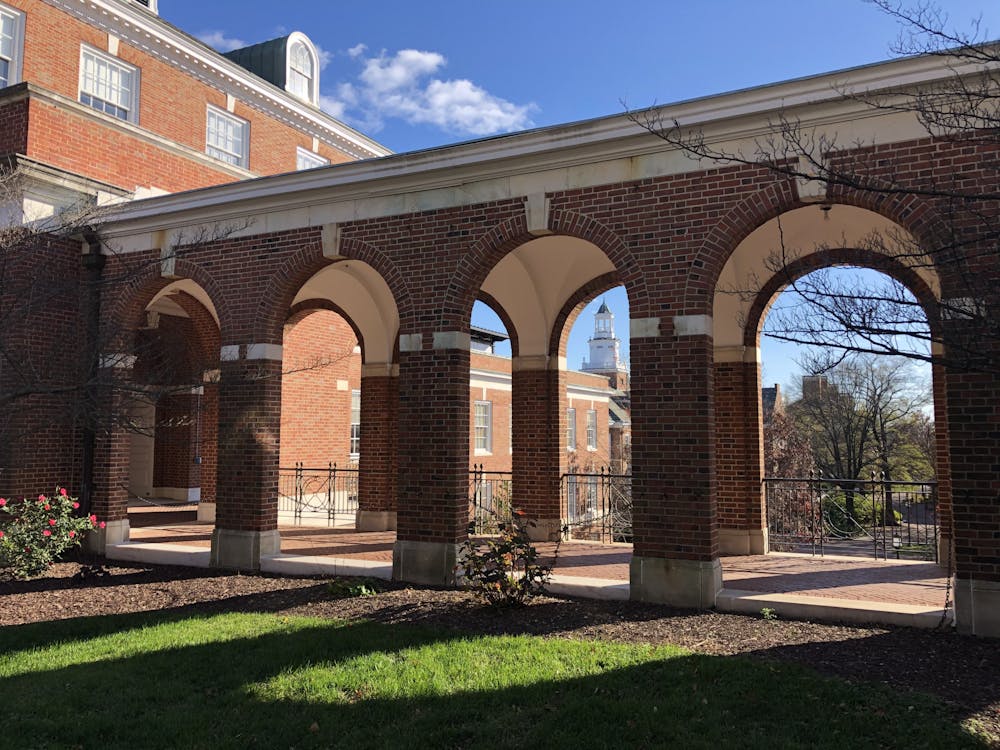Global China Connection (GCC) held a seminar discussing the ongoing U.S.-China technology competition on Dec. 1. The seminar featured Nathaniel Ahrens, a fellow at the Paul H. Nitze School of Advanced International Studies (SAIS) Foreign Policy Institute, Terry Thompson, a cybersecurity expert and SAIS lecturer, and Rui Ma, the host of the Tech Buzz China podcast. The event was moderated by Robert Barbera, an Economics professor at Hopkins.
Junior and Co-President of GCC Ivy Wang explained the relevance of the seminar in an interview with The News-Letter.
“There have been several events in the past year that put a spotlight on the tension of Sino-American relationships. One is the attempted ban on TikTok and WeChat, which really affected our generation,” she said. “There are a lot of concerns surrounding the two countries in regard to national security, economic development and global leadership.”
The assumption that a partnership with China would eventually pull China into the liberal world proved to be wrong with the rise of competition between the two countries. Thompson believes that the perceptions that U.S. officials had about China’s policies being influenced towards democracy are a good example of mirror-imaging.
“We often think that how we behave is how others will behave, but it didn’t turn out to be that way,” he said.
Companies in the U.S. that work with China are now expected to aid the rise of America’s primary strategic competitor. There are also concerns about the dual-use implication of emerging technologies as the lines between military and commercial uses are blurred.
Thompson demonstrated that much of China’s cyber espionage is driven by their economic plans. He cited provisions of China’s recent economic Five-Year Plans that link directly to some of the targets of Chinese cyberattacks.
Ahrens argued that control over technological advancement thus is one of the most critical concerns for domestic and foreign policy in the United States.
“The U.S. government will stay deeply concerned with technology and will continue to see rampant theft for strategic and military applications,” he said. “Governments exerting greater control over technology and trade will have far-reaching effects, and this is the lens through which U.S.-China relations should be interpreted going forward.”
Ma offered some insights into the domestic Chinese technology industry, describing a much more competitive market than that of the United States. According to Ma, there is less regulation on anti-competitive behaviors, which allows companies to ban links from competitors and forces users to choose between platforms to use.
Ma cited this culture as a reason why successful Chinese companies such as TikTok are able to dominate world markets.
“The companies that are able to grow are truly great companies,” she said. “TikTok was able to overcome the huge obstacles in the domestic market, and it didn't surprise me that it was able to grow so quickly in the West.”
In an interview with The News-Letter, senior Chenzhuo Li expressed his appreciation for the range of expertise that the panelists offered.
“The event had wonderful speakers involved in the topic who offered a comprehensive understanding of tech competition between the U.S. and China,” he said.
Junior and Co-President of GCC Cherlin Zhu also enjoyed the comprehensive level of understanding that the panelists brought to the topic.
“Although our speakers had different areas of expertise, they were able to build on each other’s knowledge and experiences, and they really explored the complexities of tech tensions between the two countries,” she said.
Expectations for the incoming Biden administration
Ahrens believes that the future of U.S. negotiations with China will and should change as President-elect Joe Biden takes office.
“The Biden administration will have an easier time to get allies to work together on a deal about standards of core technologies,” he said. “The U.S. needs to be thinking more strategically and to play a stronger role than traditionally.”
Thompson agreed, noting his expectation for the Biden administration to depart from President Donald Trump’s approach by bringing cybersecurity personnel back to the White House.
“The Trump administration fired all the knowledgeable cybersecurity people who worked in White House,“ he said. “The ban was focused on two vulnerabilities: those being the location data of users and the opportunity for the [Chinese Communist Party] to inject disinformation to U.S. users.”
However, despite expectations of better relations, panelists were skeptical of any fundamental changes in Sino-American relations.
Thompson highlighted differences in approaches towards technology between the American and Chinese leadership.
“The [Chinese Communist Party] is a Leninist party, and its objective is to maintain control over everything. Loss of control is anathema to that leadership,” he said. “Therefore, their leadership thinks differently than we do about these things.”
Ahrens also predicted that the Biden administration will not reverse restrictions on Chinese technology that were implemented by Trump.
“There’s a lot of continuity on that front,“ he said. “There will be a more sophisticated response to how regulations get rolled out and communicated, but their content is similar.”
In an email to The News-Letter, senior Becca Badon said that she was interested to hear the panelists’ thoughts about the Biden transition and its effect on Sino-American relations.
“There are a lot of moving parts between the transition to a Biden administration in the U.S., the release of the 14th five year plan in China and a lot of complex questions about how technology will continue to impact international relations,” she wrote.
Wang hopes that attendees were able to better inform their perspectives on Sino-American relations after hearing from experts in the field.
“We hold these events in order to create a conversation on campus,“ she said. “Audience members come in with their own beliefs and facts, but we hope that they’ll leave with more information or even a changed perspective.”





